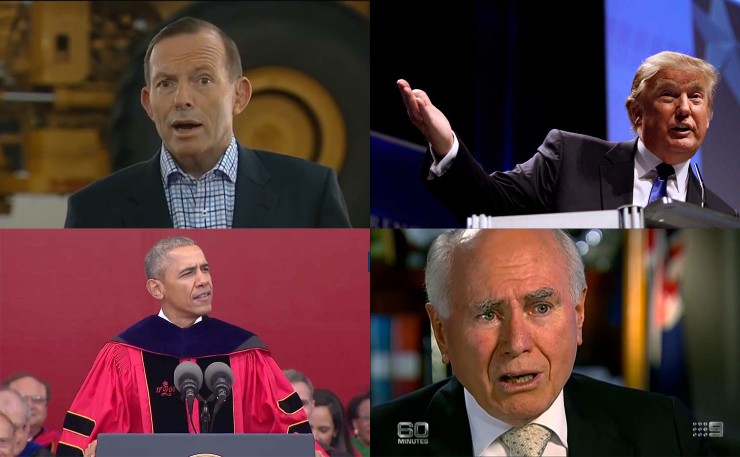If you’re going to lie, make it a big one. And nowhere are they bigger than from the mouths of our leaders, writes Richard Hil.
It’s not unusual for the powerful to distort, manipulate and deceive. Orwellian doublespeak, spin and obfuscation have become the everyday stuff of power elites.
It’s been like this for a very long time. We used to call it propaganda, being “economical with the truth”, or straight out lying – granted, they’re not all the same thing, but you get where I’m heading.
If some commentators are to be believed, we’re now in an era of hyper-real “post truth-cum-fake news” where it’s just about impossible to believe anything.
The purpose of such cynicism is of course to achieve power or, more accurately, to put into practice a preferred worldview. Typically, this involves blue-sky promises laced with conviction, and is commonly bereft of principle. Saying one thing and doing another is the collateral damage of the sales pitch. It’s what today’s politics is all about.
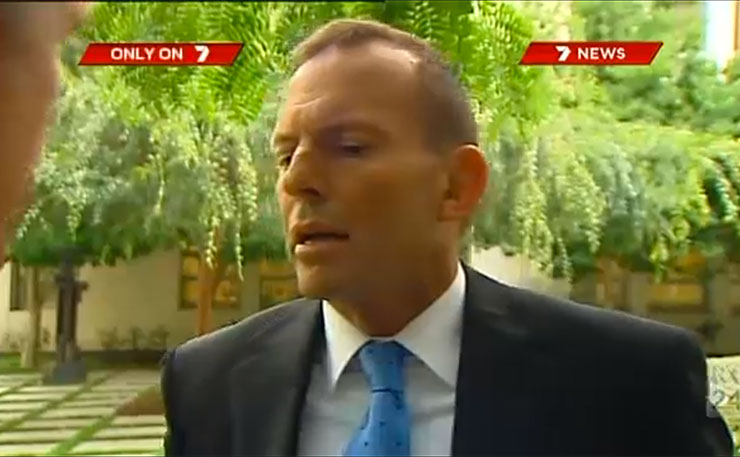
In most of today’s political systems, deceit and distortion are the stock-in-trade of election campaigns, spectacularly exposed once a party or autocrat gains power. It’s then we hear the usual enraged accusations of duplicity, lying, cheating, and the rest. U-turns, backflips, broken promises and even Howard’s famed “core and non-core promises” are justified on the grounds that things are much worse than we previously thought. There may even be talk of emergency, crisis or a “threat to our way of life.” It’s a familiar ploy.
Former leader of the Coalition government, Tony Abbott, was perhaps the most cack-handed exponent of this strategy, infamously declaring on the eve of the 2013 election that he would never ever plunder health, education and other budgets, only to seek to do just that soon after gaining office.
Ultimately, Abbott and his hapless treasurer, Joe ‘cigar-chomping’ Hockey, were dumped following the disastrous 2014 budget. Both of these elected “representatives” displayed a fundamental disregard for the electorate and indeed for civil society more generally.
How else to explain their blatantly contradictory actions? Simple pragmatism? No. It wasn’t as if Abbott woke up one morning and suddenly decided on a policy U-turn. It was all pre-planned, calculated (in a cack-handed sort of way) to gain office, come what may.
It worked. For a while.
Not that there’s anything new about these sorts of shenanigans. Citizens in most political systems, including liberal democracies, have long become accustomed to this sort of thing. It perhaps explains why voters in the US are so cynical about their elected officials, or why according to recent polls conducted by the ANU, Ipsos, and others, growing numbers of Australians have become disillusioned with mainstream parties, indeed, with democracy itself. Nearly a quarter of Australian voters say they’re prepared to vote for minor parties.
Not surprisingly, the ALP and Coalition are petrified by the prospect of political realignment. The conservative far-right on the other hand has become emboldened, sensing in today’s fraught political climate the possibility of an Aussie version of the Brexit-Trump moment. It’s why Trump admirer and tireless crusader of “free speech”, Cory Bernardi, is lurking in the shadows.
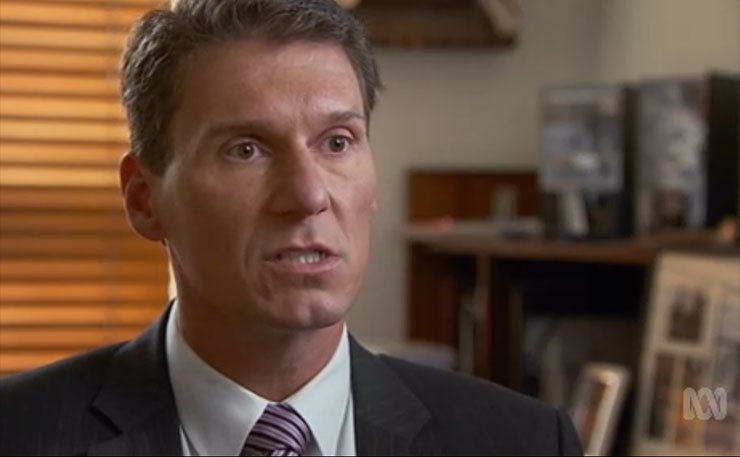
Given such uncertainty, the temptation to tell the big lie seems irresistible. If it means the difference between government and time spent on the opposition benches, then why not?
The big lie usually comes sugar-coated, or wrapped in rhetorical flourishes that suggest care and empathy. It’s pure theatre of course, based on the belief that ordinary citizens can be easily swayed. After all, they’re the malleable masses, seemingly incapable of separating fact from fiction.
Hitler’s propaganda minister, Joseph Goebbels, milked this assumption for all it was worth. But once the big lie was told, Goebbels insisted, it had to be protected, at all costs. “If you tell a lie big enough and keep repeating it, people will eventually come to believe it” he said, adding that, “the lie can be maintained only for such time as the State can shield the people from the political, economic and/or military consequences of the lie.”
It follows therefore, that every effort has to be made “for the State to use all of its powers to repress dissent, for the truth is the mortal enemy of the lie, and thus by extension, the truth is the greatest enemy of the State.”
According to this logic, there is nothing more dangerous than the truth. And that’s why governments that enact violence against their own citizens or other nations, spend so much time indulging in what the US military now refer to as “information warfare”, which in reality is code for hard core propaganda.
The historical trail of lies – whoppers and routine fibs – has been well documented. In the US, big lies are as common as apple pie. They go right back to the earliest presidents.
Writing in The Progressive Magazine in 1998, Howard Zinn noted that “there’s a long list of Presidents who have lied to us and deceived us, especially since World War II, about activities that we had every right to know, activities in which thousands, even millions, of people lost their lives.”
Thus, Harry Truman lied to the world about the reasons for bombing Hiroshima and the US war in Korea; Dwight Eisenhower fibbed about the role of the US in the overthrow of a democratic government in Guatemala; John Kennedy told porkies about the failed 1961 US invasion of Cuba; Lyndon Johnson and later Richard Nixon masked the horrors inflicted on Vietnam and Cambodia; and Ronald Reagan covered up the truth about the US’s support for the Contras in Nicaragua.
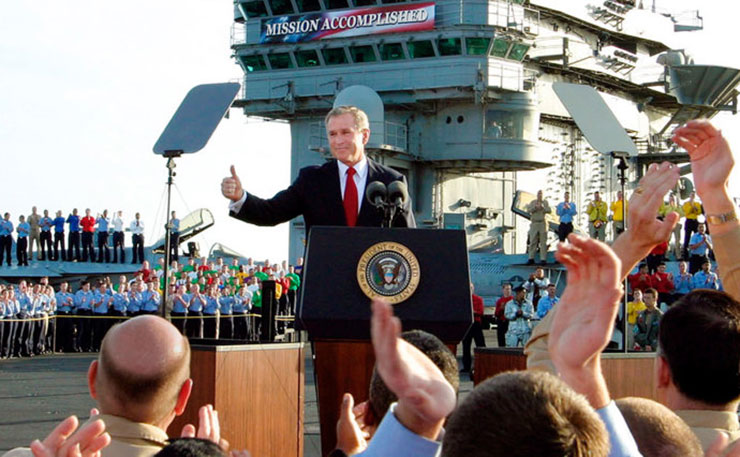
And on it goes. George Bush senior lied about reasons for the 1989 invasion of Panama and US incursions into the Middle East; Bill Clinton lied about the bombing of a “nerve gas plant” in Sudan (probably to divert attention from the Lewinsky affair); and George W. Bush told the infamous whopper about weapons of mass destruction in Iraq.
Our own government, care of John Howard, also peddled that lie. Obama has been similarly economical with the truth, avoiding public acknowledgment of civilian deaths caused by US drones, pressing ahead with expansion of the US’s nuclear weapons program while saying the opposite, and presiding over record weapon sales to Saudi Arabia which is bombing Yemen into oblivion.
So, when Donald J. Trump was elected president on 9 November 2016, the lies and distortions that characterised his campaign were merely part of a long tradition of calculated untruths. Perhaps the only difference is that the more Trump lied, the more he accused his detractors, especially the media, of the same. And when Trump first proclaimed “I’m your voice” at the 2016 Republican Convention he aimed to appeal to a certain constituency – the poor and marginalised – who would eventually help propel him into office.
Yet here was a man of considerable inherited wealth with a long history of business exploitation who seemingly identified with the disenfranchised, the “ordinary” people of America. It didn’t wash.
In promising to “make America great again” Trump was in fact gambling on the tragedy of failed empire and the ravages of globalisation. Having conned the rust belters, all he needed was something or someone to blame – easy: Obama, Clinton, liberals, radicals, the corporate elites, the media, the GOP establishment, judges, trade treaties, political correctness, the Chinese, Mexicans, etc.
Trump’s pitch for economic nationalism, beefed-up “security” and the dismantling of the “administrative state” is a cruel deception. It might make America “great” for some, but certainly not for those at the bottom of the pile. The proposed 2018 budget reveals the full extent of Trump’s project – one designed to continue, at warp speed, a process David Harvey describes as “accumulation through dispossession.”
The 50-page summary issued in mid-March proposes a massive hike in military spending ($52.3 billion, or 10 per cent of the Federal budget), largely at the expense of public programs. Areas hit hardest include environmental protection (31 per cent), state development (29 per cent), agriculture (21 per cent), labour (21 per cent), justice (20 per cent), health and health services (16 per cent), commerce (16 per cent), education (14 per cent), transportation (13 per cent), and housing and urban development (12 per cent). Less targeted are energy, homeland security, the treasury, veteran affairs and NASA.
The full picture of these cuts, and their impact on the poorest, has yet to be determined, but it will be significant. They’ll hurt.
Take for example the area of health and health service cuts, which amount to over $12 billion and impacts on community services programs like the Low Income Home Energy Assistance Program, or the National Institute of Health.
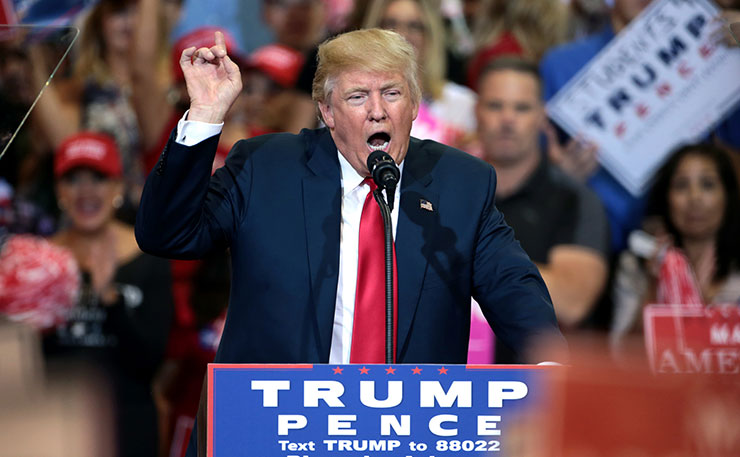
In education, $9.2 billion is culled in what Alicia Parlapiano and Gregor Aisch of the New York Times describe as “a full-throated support for school choice programs championed by Education Secretary Betsy Devos.”
The budget plan allocates over $1 billion more to public and private school choice programs, while at the same time “eliminating funding for before- and after-school and summer programs.”
Work-study programs get much less funding, “while the Federal Supplemental Educational Opportunity Grant, which is reserved for college students with the greatest need for financial aid, would also be eliminated.”
In the area of Housing and Urban Development the budget proposes a $4.3 billion cut, meaning a direct blow to anti-poverty programs, rental assistance and homeownership programs and affordable housing initiatives.
Contrast all this with how Trump has approached defence spending – no austerity there! It’s a full spectrum splash that will build on the already massive allocation of funds flowing into the war chest.
Trump has also set aside a tidy sum to build his notorious wall on the Mexican-US border, and more money has been allocated to track down “illegal immigrants” and to beef up law and order in cities across the US.
While Trump wages fiscal war on the home front, cuts to international programs of $10.9 billion will ensure further resentment among some of the world’s poorest nations. Clearly, the Trump administration has opted for hard rather than soft power.
Domestically, many of the cuts will impact most alarmingly on the very people that Trump claimed as his own: the poor and marginalized. Sure, in the short term, and with a hike in public-private infrastructure spending, jobs may well be created. Despite what he claims, Trump, as demonstrated by his two appointees to head-up the Labour department, is no lover of workplace relations, the minimum wage or too much union influence. This will undoubtedly continue the trend under the Obama administration of employment growth on the back of low paid, casualised, de-unionised precarious labour.
But even more suffering is about to be heaped on the wretched of the rustbelts. In doing away with many of the regulations safeguarding citizens from environmental pollution and pharmaceutical poisoning Trump will, as noted by 137 NGOs in their submission to the White House on 28 February, expose millions of people to hazardous and potentially lethal risks.
As of March 20, 2017 Trump has signed 38 executive actions, many of them proclamations and memoranda. These measures have been designed to “make America great again” – assuming it ever was – especially for the billionaires and corporations. But if you’re thinking it’s different here, think again.
Consider the cuts to penalty rates, the government’s warnings on increases to the minimum wage, the chipping away at the welfare budget, constant attacks on the trade unions, wage stagnation, tax cuts for the rich, casualisation, and the growing divide between the rich and poor.
All this – as per usual – is being sold as good economic management designed to boost productivity and economic growth. The truth however, as the new leader of the ACTU, Sally McManus, recently told the National Press Club, is that “the [neoliberal]experiment has run its course”.
She’s right. The lies no longer work.
Donate To New Matilda
New Matilda is a small, independent media outlet. We survive through reader contributions, and never losing a lawsuit. If you got something from this article, giving something back helps us to continue speaking truth to power. Every little bit counts.

